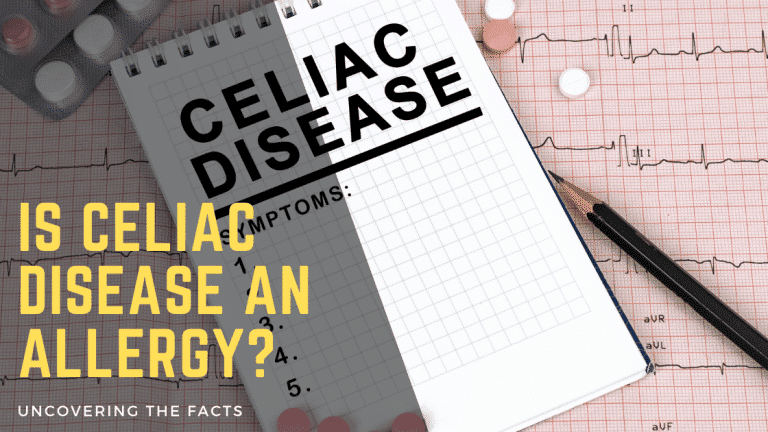Can Celiacs Touch Gluten? – Cross-Contamination Concerns Explained

Since my celiac disease diagnosis back in mid-2021, I’ve been navigating the twists and turns of embracing a gluten-free lifestyle. And guess what? I’m still learning something new every single day!
A question that often arises is – can celiacs touch gluten without suffering adverse effects? The simple answer is yes, but that doesn’t mean we can let our guard down!
Cross-contamination remains a significant concern and requires vigilance in our daily routines.
In this article, I’ll delve deeper into the safe handling of gluten-containing items, discuss strategies to minimize cross-contamination risks and share my personal experiences in mastering these challenges.
Join me as we explore ways to confidently navigate our gluten-free lives while keeping potential hazards at bay!
Understanding Celiac Disease And Gluten Sensitivity
Did you know that celiac disease affects 1 in every 133 people in the US? That’s a staggering number, and it highlights the importance of understanding this autoimmune disorder.
As someone with celiac disease myself, I’ve encountered numerous misconceptions about what living a gluten-free lifestyle really entails.
One common question is whether or not we can even touch gluten without experiencing adverse effects.
In order to answer this question and provide some clarity on the subject, let’s first dive into what exactly celiac disease and gluten sensitivity are.
Celiac disease is an autoimmune disorder where the ingestion of gluten leads to damage in the small intestine.
Gluten sensitivity, on the other hand, does not involve intestinal damage but still results in similar symptoms when consuming gluten-containing foods.
Both conditions require strict adherence to a gluten-free diet as the primary treatment method.
Living with either of these conditions goes beyond just avoiding certain foods; it involves being constantly vigilant for potential cross-contamination risks and educating ourselves and others around us about safe practices for managing our health.
With that said, let’s address the big question: Can we safely touch gluten?
Debunking The Myth: Can Touching Gluten Harm You As A Celiac?
Now that you’re here let’s talk about one of the most common gluten misconceptions out there – if touching gluten can actually harm those with celiac disease.
I know firsthand how important it is to understand every aspect of living a gluten-free life and identifying potential dangers in order to avoid any sensitivity symptoms.
The good news is that simply touching gluten-containing items isn’t going to cause damage to your intestines or trigger an autoimmune reaction.
However, don’t jump for joy just yet!
While touching gluten may not be directly harmful, cross-contamination remains a very real concern for us celiacs.
It’s essential to maintain vigilance when preparing food or handling kitchen utensils since even small amounts of gluten transferred through touch could end up being ingested accidentally.
So while it might not bring direct harm from skin contact alone, remember that we still need to stay on our toes and continue practising caution in all aspects of our daily lives because avoiding ingestion is truly what matters most.
The Importance Of Preventing Cross-Contamination
So, we’ve debunked the myth that touching gluten can directly harm someone with celiac disease.
However, this doesn’t mean we can throw caution to the wind when it comes to cross-contamination in our daily lives.
In fact, let’s dive deeper into why preventing cross-contamination is crucial for maintaining a safe and healthy lifestyle for those of us with celiac disease or gluten sensitivity.
Cross-contamination risks are real and can cause significant health issues if not taken seriously.
Just imagine preparing your favorite gluten-free meal in a kitchen where gluten-containing ingredients have been used – without proper cleaning or precautions.
To avoid potential hazards such as mixing utensils up either before, during, or after cooking, having a designated gluten-free kitchen would be ideal.
If that isn’t possible, there are still steps you can take to minimize the risk of cross-contamination: using separate cutting boards and utensils for gluten-free foods, properly washing shared items between uses, and storing GF products separately from their glutinous counterparts.
Remember that mastery over your environment as someone living with celiac disease is essential – knowing how to prevent cross-contamination ensures not just your physical well-being but also your peace of mind as you navigate through life, enjoying various culinary experiences while staying safely away from harmful gluten exposure.
Practical Tips For Avoiding Gluten Exposure
As a fellow celiac, I understand how challenging it can be to navigate our gluten-free lifestyle while avoiding cross-contamination.
There are so many potential contamination sources lurking around every corner, and even the slightest exposure could lead to undesirable symptoms.
To make life easier and help you achieve mastery over your gluten-free journey, I’ve put together some practical tips on how to avoid gluten exposure.
To start with, let’s take a look at this table that highlights common areas where cross-contamination may occur:
| Area | Potential Contamination Sources | Tips for Prevention |
|---|---|---|
| Kitchen Appliances | Shared toaster ovens, cutting boards | Use designated appliances or clean well (the former is recommended for appliances like toasters) |
| Food Storage | Bulk bins, shared containers | Store food in separate labeled spaces |
| Dining Out | Shared fryers, grill surfaces | Communicate needs clearly & choose safe options |
Now that we’re aware of these potential pitfalls in maintaining a strict gluten-free diet, we must remain vigilant and proactive about protecting ourselves from inadvertent ingestion of gluten.
Educate yourself further by researching reputable resources online or joining support groups specific to living with celiac disease.
Remember: knowledge is power when it comes to mastering your gluten-free lifestyle!
Managing Daily Life With Celiac Disease Or Gluten Sensitivity
Now that we’ve boarded this gluten-free ship together and armed ourselves with practical tips for avoiding gluten exposure, let’s sail towards mastering the daily life of a celiac or someone with gluten sensitivity.
It may feel like you’re living in medieval times when trying to navigate through modern-day grocery stores while searching for safe food options, but trust me – it gets easier over time.
- Celiac Friendly Travel: Going on vacation doesn’t have to be a nightmare! Research ahead of time about gluten-free restaurants and accommodations at your destination. Many popular tourist spots now offer an array of delicious gluten-free options, including the likes of Zakopane and Krakow in Poland, so take advantage of them!
- Support Groups: Joining a local support group can help alleviate some anxiety surrounding managing celiac disease or gluten sensitivity in everyday life. Connecting with others who share similar experiences can provide encouragement, advice, and camaraderie.
Life as a celiac or someone with gluten sensitivity may require extra vigilance and planning, but once you become more familiar with how to avoid cross-contamination and find suitable alternatives to replace old favourites, it becomes second nature.
Don’t forget that having fun should always be part of the equation too! Enjoy experimenting with new recipes or attending social events where you can showcase tasty homemade dishes even non-celiacs will love.
Remember – although eliminating gluten from your lifestyle might feel daunting initially, ultimately, it’ll pave the way for better health and happiness along the journey called life!
Can Celiacs Touch Gluten – Conclusion
As individuals with celiac disease or gluten sensitivity, we must be proactive in managing our health by being vigilant about cross-contamination prevention.
Remember, we’re not just fighting for ourselves but also for those who share this journey with us.
Together, let’s continue to raise awareness, educate others, and create a world where living gluten-free is hassle-free!
Disclaimer: This content is based on my personal experience as an individual diagnosed with celiac disease and IBS (Irritable Bowel Syndrome) who follows a strict gluten-free diet. This does not constitute medical advice. Please consult a medical professional, nutritionist, or qualified dietitian for personalized, professional advice.





